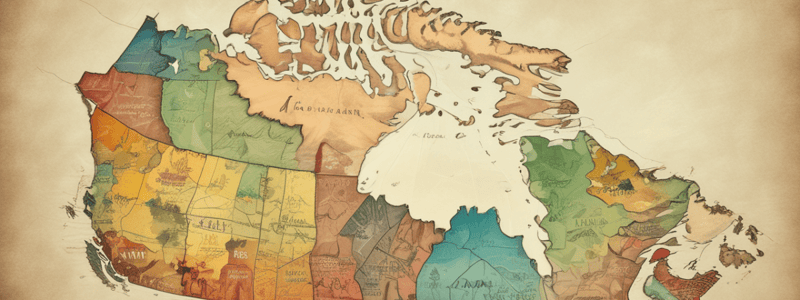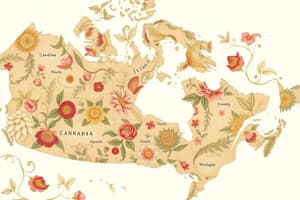Podcast
Questions and Answers
What is the main difference between Canada's provinces and its territories?
What is the main difference between Canada's provinces and its territories?
- Economic system
- Population density
- Location within the country
- Government structure (correct)
What percentage of Canada's population lives in the provinces?
What percentage of Canada's population lives in the provinces?
- 50%
- 99%
- 97% (correct)
- 75%
How many provinces and territories are in Canada?
How many provinces and territories are in Canada?
- 10 provinces and 3 territories (correct)
- 12 provinces and 3 territories
- 10 provinces and 2 territories
- 12 provinces and 2 territories
What is the capital city of Canada?
What is the capital city of Canada?
What is the term sometimes used to refer to the territories in Canada?
What is the term sometimes used to refer to the territories in Canada?
What is the French-Canadian culture predominantly found in?
What is the French-Canadian culture predominantly found in?
What does the name 'Yukon' likely originate from?
What does the name 'Yukon' likely originate from?
Which province has the largest population in Canada?
Which province has the largest population in Canada?
What is the smallest province in Canada?
What is the smallest province in Canada?
Approximately how many years ago did the Inuit arrive in the Arctic?
Approximately how many years ago did the Inuit arrive in the Arctic?
Which province has the largest Métis population in Canada?
Which province has the largest Métis population in Canada?
What percentage of Canada's population are indigenous people?
What percentage of Canada's population are indigenous people?
What is the name of the territory considered a landmark case in indigenous self-governance in North America?
What is the name of the territory considered a landmark case in indigenous self-governance in North America?
What is the name of the company that conducted much of the early Canadian fur trade?
What is the name of the company that conducted much of the early Canadian fur trade?
What is the estimated length of time that people have lived in the area that is now Canada?
What is the estimated length of time that people have lived in the area that is now Canada?
Flashcards
Canada's Government Structure: Provinces vs. Territories
Canada's Government Structure: Provinces vs. Territories
Provinces have their own constitutional powers, while territories are organized by statute and under federal governance.
List Canada's 10 provinces.
List Canada's 10 provinces.
Newfoundland and Labrador, Prince Edward Island, Nova Scotia, New Brunswick, Quebec, Ontario, Manitoba, Saskatchewan, Alberta, British Columbia.
List Canada's 3 territories.
List Canada's 3 territories.
Nunavut, Northwest Territories, Yukon.
Population Distribution in Canada
Population Distribution in Canada
The population is concentrated in the provinces, with most people living in major urban centers.
Signup and view all the flashcards
Indigenous Groups in Canada
Indigenous Groups in Canada
First Nations, Inuit, and Métis.
Signup and view all the flashcards
How do French and Indigenous influences affect Canadian provinces?
How do French and Indigenous influences affect Canadian provinces?
Many provinces have French and Indigenous influences in their names and etymology. For example, Quebec and Saskatchewan.
Signup and view all the flashcards
Year Canada Became a Country
Year Canada Became a Country
Canada becomes a self-governing country under the British Empire.
Signup and view all the flashcards
Ancient History of Canada
Ancient History of Canada
People have lived in what is now Canada for at least 12,000 years.
Signup and view all the flashcards
Canadian Residential Schools
Canadian Residential Schools
The forced enrollment of indigenous children into residential schools, often isolating them from their families and cultures.
Signup and view all the flashcards
Role of the Hudson's Bay Company
Role of the Hudson's Bay Company
The Hudson's Bay Company played a major role in the early Canadian fur trade, influencing economic development and interactions between European and indigenous populations.
Signup and view all the flashcards
Canadian Provincial and Territorial Governments
Canadian Provincial and Territorial Governments
Each province and territory has its own legislature. Some are called assemblies while others have unique names such as the House of Assembly or the National Assembly.
Signup and view all the flashcards
Origin of the Word Canada
Origin of the Word Canada
The word Canada probably originated from the Huron-Iroquois word kanata, meaning 'village'.
Signup and view all the flashcards
Canada's Size & Population
Canada's Size & Population
Canada is the second largest country by land mass but has a much smaller population compared to the United States.
Signup and view all the flashcards
Canada's Coastline
Canada's Coastline
Canada boasts the longest coastline in the world, stretching along the Pacific, Atlantic, and Arctic oceans.
Signup and view all the flashcardsStudy Notes
Canada's Provinces and Territories
- Canada has 10 provinces and 3 territories, which are different from states in the United States.
- Provinces have their own constitutional powers and operate similarly to American states, while territories are organized by statute and are under federal governance.
- The provinces are home to 97% of Canada's population, and each province has its own capital city.
Provinces of Canada
- The 10 provinces of Canada are:
- Newfoundland and Labrador
- Prince Edward Island
- Nova Scotia
- New Brunswick
- Quebec
- Ontario
- Manitoba
- Saskatchewan
- Alberta
- British Columbia
- Each province has its own unique characteristics, such as Newfoundland and Labrador having its own time zone, and Prince Edward Island being the smallest province.
- Many provinces have French and Indigenous influences in their names and etymology.
Territories of Canada
- The 3 territories of Canada are:
- Nunavut
- Northwest Territories
- Yukon
- The territories have small populations but rich histories, and are often challenging places to live due to their extreme weather and geographical isolation.
- Nunavut is a landmark case in indigenous self-governance, with the majority Inuit population having a large degree of control over the government of the territory.
History of Canada
- People have lived in the area that is now Canada for at least 12,000 years, with some estimates suggesting that people have been in Canada for as much as 40,000 years.
- The earliest European contact with the people of Canada came from Viking people, who created a small settlement in what is now Newfoundland around 1,000 years ago.
- Canada was a British colony before becoming its own country in 1867, and the Hudson's Bay Company played a significant role in the early Canadian fur trade.
Effects on Indigenous Peoples
- The history of Canada as a colonial settlement is inseparable from the harm caused to indigenous groups, including the forced sending of indigenous children to residential schools.
- Today, indigenous people (First Nations, Inuit, and Métis) make up around 5% of Canada's population, and efforts are being made to revive indigenous languages in many communities and school districts across the country.
Government Structure
- Each province and territory has its own government, with some styled as legislative assemblies and others having unique names such as the House of Assembly or National Assembly.
- Provincial and territorial governments have their own responsibilities and powers, but typically have less individual power than American states.
Fun Facts About Canada
- The word Canada likely derives from the Huron-Iroquois word kanata, meaning "village".
- Canada is the second-largest country in the world by land mass, but has only around 1/10th of the population of the United States.
- Canada has the longest coastline in the world, at a staggering 243,042 km.
Studying That Suits You
Use AI to generate personalized quizzes and flashcards to suit your learning preferences.




